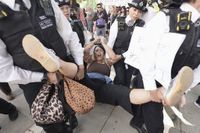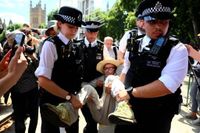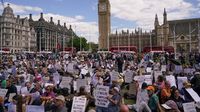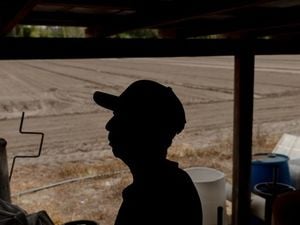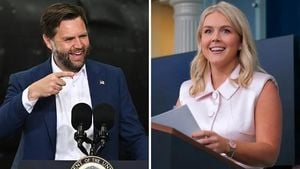On August 9, 2025, the heart of London became the epicenter of one of the largest mass arrests in recent British history. Police detained at least 466 people in Parliament Square for publicly supporting Palestine Action, a pro-Palestinian activist group recently outlawed under the UK’s anti-terrorism laws. The arrests, which unfolded throughout Saturday, have ignited a fierce debate about the boundaries of protest, the reach of anti-terrorism legislation, and the future of free expression in the United Kingdom.
According to the Metropolitan Police, officers began making arrests early in the afternoon as crowds gathered near Parliament to protest the government’s decision to proscribe Palestine Action. The group, which says it aims to disrupt the operations of weapons manufacturers supplying the Israeli government, was banned in early July after two activists broke into RAF Brize Norton—Britain’s largest air base—and caused an estimated £7 million ($9.3 million) in damage to two military aircraft. The activists, according to France 24, sprayed red paint into the engines and used crowbars to inflict further damage, actions they described as a response to what they called Britain’s indirect military support for Israel amid the ongoing war in Gaza.
The government’s move to ban Palestine Action, placing it on par with terrorist organizations such as Hamas, al Qaeda, and ISIS, has been sharply criticized by a broad coalition of civil liberties groups, international organizations, and opposition activists. Critics—including the United Nations, Amnesty International, and Greenpeace—have called the ban a case of legal overreach and a direct threat to free speech. Sacha Deshmukh, Chief Executive of Amnesty International UK, urged Metropolitan Police Chief Mark Rowley to exercise restraint in policing people holding placards expressing support for Palestine Action. "The arrest of otherwise peaceful protesters is a violation of the UK's international obligations to protect the rights of freedom of expression and assembly," Amnesty International UK posted on X (formerly Twitter) on Saturday.
Despite the government’s stern warnings, hundreds of protesters—many waving Palestinian flags and carrying signs reading “I oppose genocide, I support Palestine Action”—gathered in defiance. Defend Our Juries, the group that organized the protest, claimed that over a thousand people attended, though police estimated the crowd at 500 to 600 when the demonstration began. Organizers described the turnout as "unprecedented," stating, "unprecedented numbers had risked arrest and possible imprisonment to defend this country's ancient liberties." They vowed to continue their campaign, with plans for further actions in September.
The Metropolitan Police, who had cautioned that anyone displaying support for the banned group would be arrested, methodically worked through the crowd. Officers escorted protesters to temporary prisoner processing points in Westminster, where those whose details could be confirmed were bailed with strict conditions not to attend further protests in support of Palestine Action. Eight additional arrests were made for other offenses, including five for assaults on officers, though police confirmed that none of the officers sustained serious injuries. Scotland Yard stated, "We are confident that anyone who came to Parliament Square today to hold a placard expressing support for Palestine Action was either arrested or is in the process of being arrested."
The scene was tense but largely peaceful. According to Le Monde, as police moved in, onlookers and fellow demonstrators applauded those being led away and shouted "shame on you" at officers. Richard Bull, a wheelchair user among the protesters, told AFP, "Let them arrest us all. This government has gone too far. I have nothing to feel ashamed of." Another protester, an 80-year-old woman from Surrey who requested anonymity, said she attended to show "what a farce" the government’s decision was, observing, "I watched a few being carried off by police but there simply weren’t enough police to arrest all."
The government, however, has stood firm. Home Secretary Yvette Cooper, who initiated the ban after the June break-in at the air base, thanked police for "dealing with the very small number of people whose actions crossed the line into criminality." She emphasized the distinction between the right to protest and supporting a proscribed organization, stating, "The right to protest is one we protect fiercely but this is very different from displaying support for this one specific and narrow, proscribed organization." Cooper also cited strong security advice and an assessment from the Joint Terrorism Assessment Centre, which concluded that Palestine Action "prepares for terrorism." She added, "Many people may not yet know the reality of this organization. It is not non-violent."
The government’s position is that the ban is necessary for national security. The UK interior ministry reiterated before Saturday’s protest that Palestine Action is suspected of other “serious attacks” involving violence, significant injuries, and extensive criminal damage. Since the ban came into effect on July 5, police forces across the UK have made scores of similar arrests. The first three individuals were charged in England and Wales with supporting Palestine Action following a demonstration on the day of the ban, and seven more have been charged in Scotland, which operates under a separate legal system.
Yet the crackdown has only fueled the determination of Palestine Action’s supporters and civil liberties advocates. Defend Our Juries, in a statement on their website, argued, “Once the meaning of ‘terrorism’ is separated from campaigns of violence against a civilian population, and extended to include those causing economic damage or embarrassment to the rich, the powerful and the criminal, then the right to freedom of expression has no meaning and democracy is dead.”
The legal battle over the ban is far from over. Last week, Palestine Action’s co-founder Huda Ammori won a bid to challenge the government’s decision, with a London High Court judge granting permission to seek a judicial review. A full hearing on the matter is scheduled for November, and the outcome could have far-reaching implications for protest rights and the definition of terrorism in the UK.
The events in London come amid a broader wave of political activism and protest across the country. Pro-Palestinian demonstrators planned a march on August 9 ending at No. 10 Downing Street, while other groups prepared to march the following day demanding the safe release of Israeli hostages held in Gaza since October 7, 2023. Police are also bracing for protests outside hotels housing asylum seekers, with tensions running high between supporters and opponents of the government’s immigration policies. Deputy Assistant Commissioner Ade Adelekan acknowledged that the scale of the weekend’s events would “put pressure” on police resources, noting, “This is going to be a particularly busy few days in London with many simultaneous protests and events that will require a significant policing presence.”
As the dust settles on a dramatic day in Parliament Square, the clash between the government’s anti-terrorism stance and the rights of protesters remains unresolved. With a legal challenge looming and activists vowing to return to the streets, the debate over where to draw the line between security and liberty continues to roil the UK’s political landscape.
